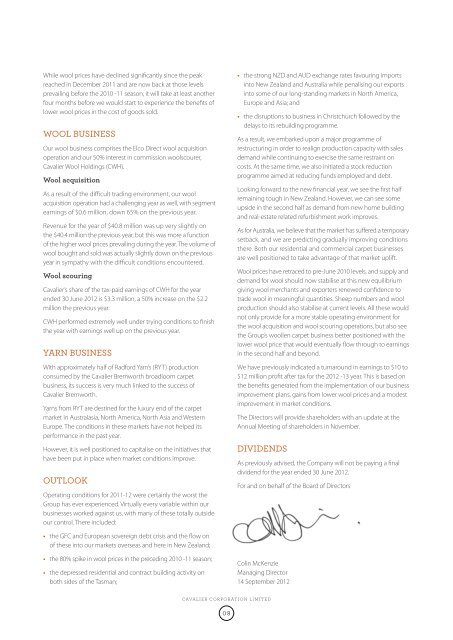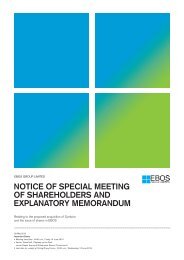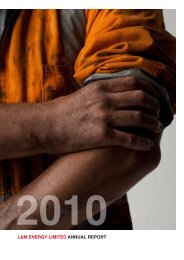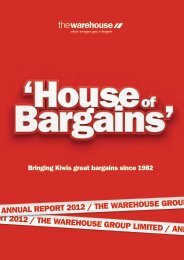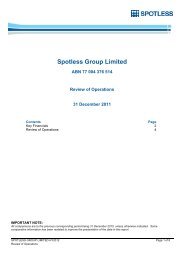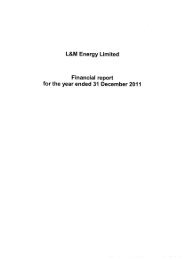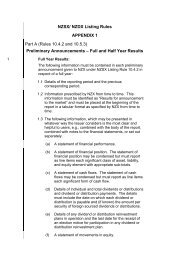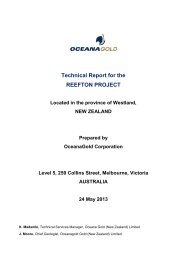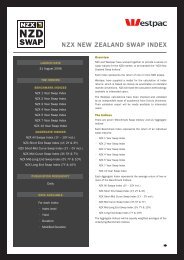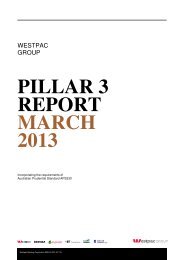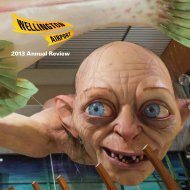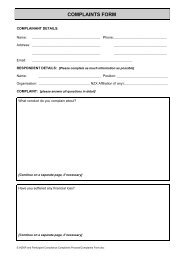CAVALIER CORPORATION LIMITED - NZX
CAVALIER CORPORATION LIMITED - NZX
CAVALIER CORPORATION LIMITED - NZX
Create successful ePaper yourself
Turn your PDF publications into a flip-book with our unique Google optimized e-Paper software.
While wool prices have declined significantly since the peak<br />
reached in December 2011 and are now back at those levels<br />
prevailing before the 2010 -11 season, it will take at least another<br />
four months before we would start to experience the benefits of<br />
lower wool prices in the cost of goods sold.<br />
Wool Business<br />
Our wool business comprises the Elco Direct wool acquisition<br />
operation and our 50% interest in commission woolscourer,<br />
Cavalier Wool Holdings (CWH).<br />
Wool acquisition<br />
As a result of the difficult trading environment, our wool<br />
acquisition operation had a challenging year as well, with segment<br />
earnings of $0.6 million, down 65% on the previous year.<br />
Revenue for the year of $40.8 million was up very slightly on<br />
the $40.4 million the previous year, but this was more a function<br />
of the higher wool prices prevailing during the year. The volume of<br />
wool bought and sold was actually slightly down on the previous<br />
year in sympathy with the difficult conditions encountered.<br />
Wool scouring<br />
Cavalier’s share of the tax-paid earnings of CWH for the year<br />
ended 30 June 2012 is $3.3 million, a 50% increase on the $2.2<br />
million the previous year.<br />
CWH performed extremely well under trying conditions to finish<br />
the year with earnings well up on the previous year.<br />
Yarn Business<br />
With approximately half of Radford Yarn’s (RYT) production<br />
consumed by the Cavalier Bremworth broadloom carpet<br />
business, its success is very much linked to the success of<br />
Cavalier Bremworth.<br />
Yarns from RYT are destined for the luxury end of the carpet<br />
market in Australasia, North America, North Asia and Western<br />
Europe. The conditions in these markets have not helped its<br />
performance in the past year.<br />
However, it is well positioned to capitalise on the initiatives that<br />
have been put in place when market conditions improve.<br />
OUTLOOK<br />
Operating conditions for 2011-12 were certainly the worst the<br />
Group has ever experienced. Virtually every variable within our<br />
businesses worked against us, with many of these totally outside<br />
our control. There included:<br />
• the strong NZD and AUD exchange rates favouring imports<br />
into New Zealand and Australia while penalising our exports<br />
into some of our long-standing markets in North America,<br />
Europe and Asia; and<br />
• the disruptions to business in Christchurch followed by the<br />
delays to its rebuilding programme.<br />
As a result, we embarked upon a major programme of<br />
restructuring in order to realign production capacity with sales<br />
demand while continuing to exercise the same restraint on<br />
costs. At the same time, we also initiated a stock reduction<br />
programme aimed at reducing funds employed and debt.<br />
Looking forward to the new financial year, we see the first half<br />
remaining tough in New Zealand. However, we can see some<br />
upside in the second half as demand from new home building<br />
and real-estate related refurbishment work improves.<br />
As for Australia, we believe that the market has suffered a temporary<br />
setback, and we are predicting gradually improving conditions<br />
there. Both our residential and commercial carpet businesses<br />
are well positioned to take advantage of that market uplift.<br />
Wool prices have retraced to pre-June 2010 levels, and supply and<br />
demand for wool should now stabilise at this new equilibrium<br />
giving wool merchants and exporters renewed confidence to<br />
trade wool in meaningful quantities. Sheep numbers and wool<br />
production should also stabilise at current levels. All these would<br />
not only provide for a more stable operating environment for<br />
the wool acquisition and wool scouring operations, but also see<br />
the Group’s woollen carpet business better positioned with the<br />
lower wool price that would eventually flow through to earnings<br />
in the second half and beyond.<br />
We have previously indicated a turnaround in earnings to $10 to<br />
$12 million profit after tax for the 2012 -13 year. This is based on<br />
the benefits generated from the implementation of our business<br />
improvement plans, gains from lower wool prices and a modest<br />
improvement in market conditions.<br />
The Directors will provide shareholders with an update at the<br />
Annual Meeting of shareholders in November.<br />
DIVIDENDS<br />
As previously advised, the Company will not be paying a final<br />
dividend for the year ended 30 June 2012.<br />
For and on behalf of the Board of Directors<br />
• the GFC and European sovereign debt crisis and the flow on<br />
of these into our markets overseas and here in New Zealand;<br />
• the 80% spike in wool prices in the preceding 2010 -11 season;<br />
• the depressed residential and contract building activity on<br />
both sides of the Tasman;<br />
Colin McKenzie<br />
Managing Director<br />
14 September 2012<br />
<strong>CAVALIER</strong> <strong>CORPORATION</strong> <strong>LIMITED</strong><br />
08


